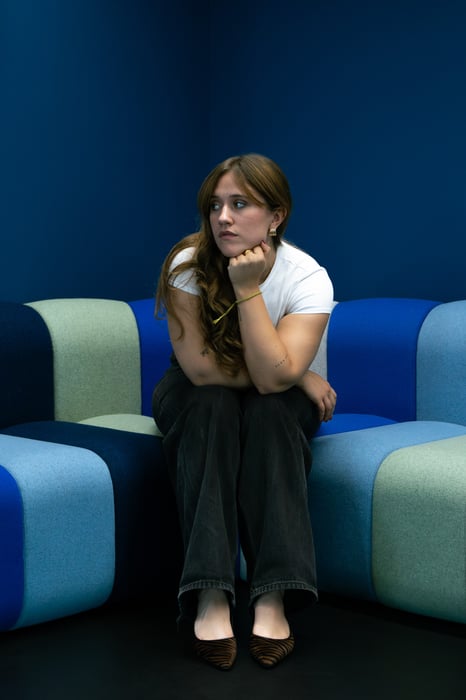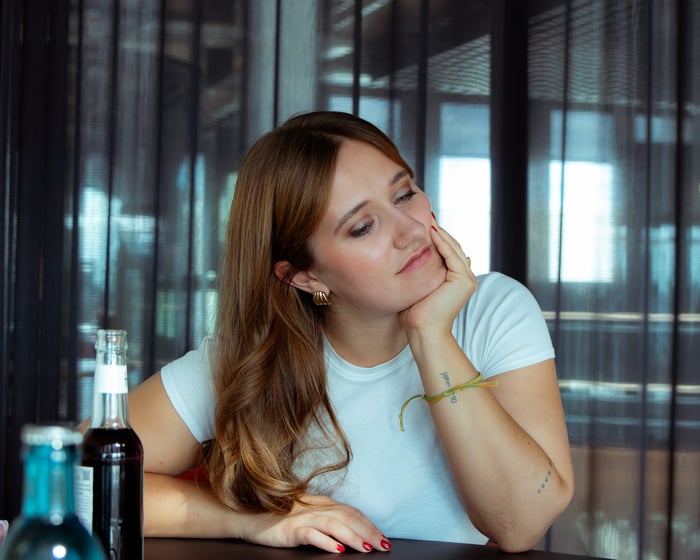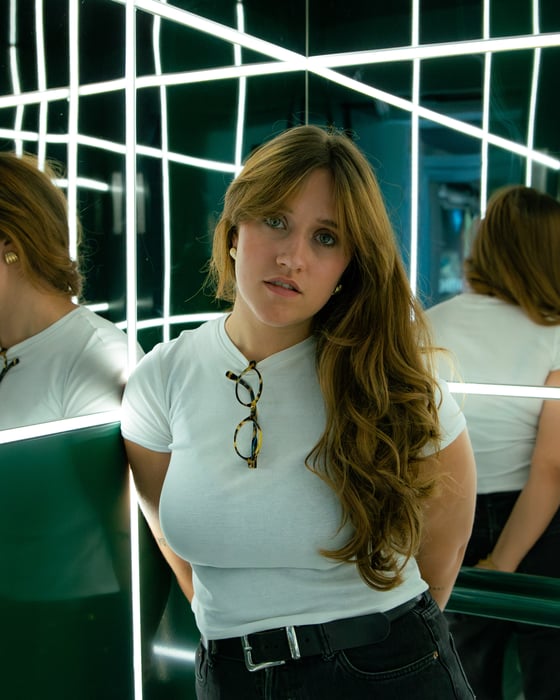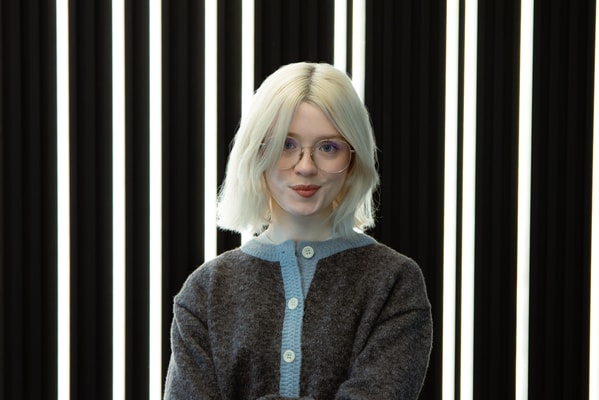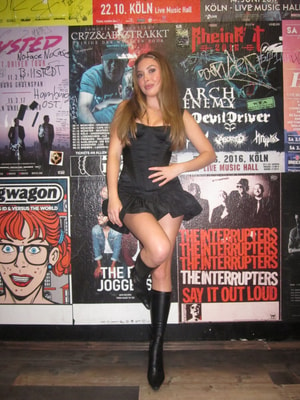Lighting Up the Scene: Muryel on Music, Emotion and her Debut-EP "House of Fire"

Get to know Muryel, the multi-talented newcomer whose debut EP House of Fire is turning heads. With heartfelt lyrics, creative storytelling, and a fearless approach to music and life, she opens up about her inspirations, songwriting process, and hopes for the future. In this candid interview, Muryel shares the stories behind her latest release, her journey from musicals to the main stage, and the lessons learned along the way.
Here's The Full Interview:
Frederike: Hi, first of all, thank you for meeting us! You had an early morning and made your television debut. How was that?
Muryel: Hi! Yes, it was awesome and exciting, but also very early. It was my first time on TV, and live TV at that. I had two guitarist friends with me. Two fans also found their way into the front row, which was really sweet.
Frederike: Oh, sweet! How would you describe Muryel in three words? You can also differentiate between your personal and musical sides.
Muryel: So, three words that sum it up would be "world's greatest overthinker"... haha. Otherwise, I would say a 100% overthinker, very caring, sometimes a little overcaring.
Frederike: So also in the direction of a people pleaser?
Muryel: Yes, very much so. My therapist has often pointed that out. Otherwise, I would say loud or too much. My therapist told me to say "multifaceted."
Frederike: Oh, that's a nice way of putting it. And what role has music played in your life before your career took off?
Muryel: A huge role. I can't remember a single day when I didn't want to do music, when I didn't do something every day to make it happen. I've always worked towards it. Music is always with me. It's the first thing I do in the morning; when I get up, I turn on the music. I always listen to music. Music is kind of like a soundtrack to life. It's cinematic.
Frederike: So there was never a tipping point for you between doing music as a hobby and music being more than just a hobby. Or was it always clear to you that this was what you wanted to do?
Muryel: Yes, it was always clear. I wrote my first song when I was 7.
Frederike: Hahah, funny, my next question would have been whether you can still remember the creation of your first song.
Muryel: Yes, I was seven. My foster brother, who was a family friend and had lived with us for a long time, turned 30. He complained to us that he was getting old. For his birthday party in the garden, I wrote him a little song. It was simply called "Birthday Song." I performed it for the family on the Singstar microphone.
Frederike: And did you play any instruments as a child, like children's drums or piano?
Muryel: A little bit, but not very well. When I was about nine, I tried to learn the flugelhorn for a year and a half.
Frederike: Flugelhorn? How did that come about?
Muryel: Yes, it's crazy. My lung capacity was apparently so good back then that on the trial day at music school, everyone said I could get sounds out of wind instruments. Then my mother said, "Okay, let's buy the little one a flugelhorn." I didn't practice with it much, but I did manage to get some sounds out of it. I'm not generally the kind of person who practices a lot.
Frederike: Haha, but do you think the flugelhorn will make a comeback?
Muryel: I hope not. I wouldn't wish that on anyone. But it is kind of badass when a woman who is so confident in life casually mentions that she can play the flugelhorn. I think it's a bit like when women say they're really good at soccer. I think that's incredibly cool.
Frederike: I couldn't agree more. How would you describe your music to someone who doesn't know you yet?
Muryel: It has a big focus on lyrics. Lots of storytelling. I like to call it leftfield pop. That means it could be played at a festival, on an indie stage, or on a pop stage.
Frederike: This "leftfield pop" also describes artists who take a rather unconventional approach to songwriting and producing. To what extent do you take an unconventional approach to songwriting? What is your process like? How does a "Muryel song" come about?
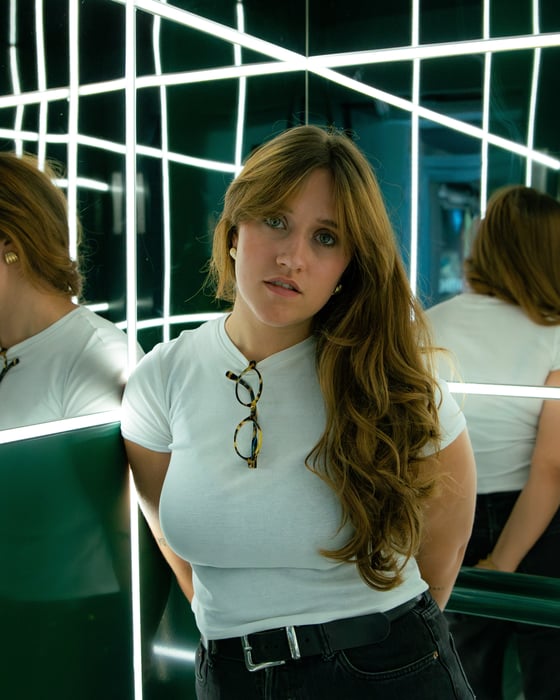
Muryel: That's an excellent question, and unfortunately, a very complex answer, because it rarely happens the same way twice. I'm a visual person. I really enjoy working with Pinterest. Sometimes, when we're out in the world and I feel like everything in my head is very loud and I can't put it into words, I enter keywords into Pinterest. For example, if I feel angry and can't communicate that in the room at that moment, I look for images. That often helps. In the past, I often brought song titles to a session even though the song didn't exist yet. I'm particular about how words sound. The ideal situation is when someone sits down at an instrument and I immediately get a thousand ideas. Unfortunately, that doesn't always happen.
Frederike: Some people refer to you as the "German Taylor Swift." Would you agree with that statement?
Muryel: No, because I don't dare. I love Taylor Swift; I worship the woman. She is a big reason why I understood that this is a real job and that it's worth fighting for. I've learned a lot from her. I consider it an incredible honor to be mentioned in the same breath as her.
Frederike: How does it make you feel when you hear this comparison? Awe or pride?
Muryel: Definitely a mixture of both. I'm super in awe of it. My biggest fear in this job is that I'll lose touch with reality at some point. And to say that I'm the German Taylor Swift is an absolute loss of reality for me. But I'm very happy about it.
Frederike: In the spirit of Taylor Swift: Do you have something in mind that would be a cute fan tradition
Muryel: My fans sometimes make me friendship bracelets. I think this gift-giving culture is really sweet, especially when the gifts are handmade. I could well imagine that writing letters might become a tradition like that.
Frederike: You've released your debut EP, "House on Fire." What's the story behind the title?
Muryel: The EP title is based on the title track, which is also called "House on Fire." I was in a writing session with my guitarist, Jordan. He introduced the rule "there is no sorry in the studio" because I apologize a lot. Because I think I'm too much or too loud. I'm always energized and always on fire. That can be great when you're on stage, but it can also be incredibly exhausting. Especially if you're a people pleaser. I find this image of "House on Fire" very powerful. I actually saw a burning house on Pinterest and thought, "That's exactly how I feel."
Frederike: And which is your favorite track on the EP?
Muryel: House on Fire. It's a bit heavy, so you have to be in the mood for it. It's the song I thought about the least when I wrote it. I just wrote the first verse on my laptop in the studio in a minute. It was very pure and honest, and for a long time, I thought it wasn't a good song. That's why, looking back, I'm very proud that I was able to admit that to myself and release it.
Frederike: And how can we imagine your thought process when it comes to releasing songs? How do you decide whether a song will be included on the EP or remain in the drawer?
Muryel: Some songs just elicited strong reactions. Matchbox Car, for example, works incredibly well live. Strangely enough, we were all surprised that the song is a crowd favorite that absolutely had to be on the EP. I like to think in concepts, very visually, and I love contrasts. The EP puts a lot of pressure on me because this is the first impression of my music out there in the world. So other stories weren't as important for me to tell right now. Maybe they'll be told later. Or maybe not at all.
Frederike: And how much fiction is in your songs or directly in the song "Fiction"?
Muryel: Very little, very little. I would like to see more fiction about the stupid things that have happened. I have to say that we intentionally used fictional characters and well-known storylines to soften some very intense topics a bit.
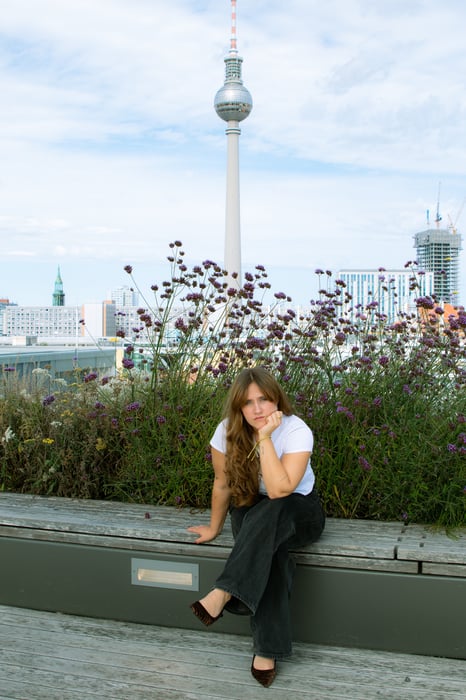
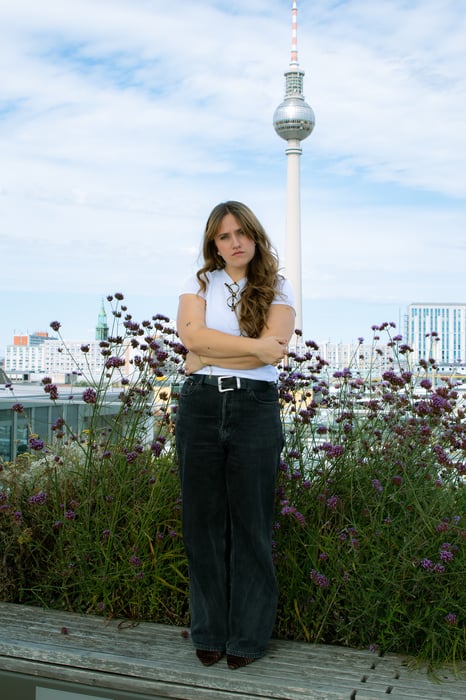
Frederike: I personally also feel that when you describe the feeling and sugarcoat it, you can tell the story in more detail.
Muryel: Yes, I agree. Well-known stories like "The Wizard of Oz" are deeply connected to an emotional response for many people. And that's exactly why it might make the person feel more open right away. I think it's also good for the listeners to have a little emotional space to add some details of their own. If I were to describe what happens in complete detail, it might no longer be such a projection screen for other people's own stories. I think it's really nice when people say, "Hey, it helped me through my situation, which was similar, but not exactly the same."
Frederike: So you mainly want to trigger emotions in your listeners?
Muryel: Yes, I want people to feel. I want people to say, 'Okay, here it's allowed; here I'm not too much.' If I'm angry, then I'm allowed to be angry. If I'm sad, then I'm allowed to be sad. If I feel like being super enthusiastic, then that's fine too.
Frederike: You mentioned it briefly earlier, you’re the world's greatest overthinker. Do you have any tips for overcoming overthinking that help you?
Muryel: Yes, but I rarely follow them myself. You tend to overthink when you don't give your feelings and thoughts enough space. I don't do it nearly enough, but what helps me the most is swimming. Because I don't have the opportunity to push my thoughts aside with music or podcasts, I have to listen to them. I also have a picture above my bed that says "go for a swim." Otherwise, physical activities help me, such as going for walks, calling my mom more often. Also, my grandparents or people I can talk to. And go on adventures and get out into nature.
Frederike: So distracting yourself?
Muryel: Yes, distraction happens when you really proactively engage with lots of other things. For me personally, it's about feeling more confronted with myself, but in a much gentler way.
Frederike: Let's go back to the EP for a moment. You shared on Instagram that you started working on "The Only Good Thing in the City" in September 2024 and that it was finished in spring 2025. How does that work? Why did you decide to revisit this project?
Muryel: We like to take two days for each song because it's important to us to create an honest vibe. I also gave the song to my label and A&R ("Artist & Repertoire"). We all kept coming back to it, and it was catchy. It was then clear that we wanted to finish writing it. Up until then, the song only had the first verse, pre-chorus, and chorus, and the chorus wasn't even completely finished lyrically. Melodically, it was as it is now, and the lyrical part was added in the spring. But the title, The Only Good Thing in the City, was clear from the beginning.
Frederike: And finally, why should people definitely not miss out on your EP?
Muryel: You definitely shouldn't miss out on my EP because I believe that it addresses many modern, current topics in today's world, but perhaps in a way that doesn't happen very often anymore. It's like "sitting down with a good friend." You go through all the emotions, it's about appreciating, venting, having fun, and being delulu.
Frederike: Live performing is also a big part of today's music scene. You've already gained a significant amount of live experience, including as a support act for major German artists such as Juli and Max Giesinger. What did you learn about yourself and performing from these experiences?
Muryel: Definitely that this is exactly what I want to do. Live performance is one of the most important assets for musicians. An important experience and life lesson I've learned is that the most successful artists are also the nicest people. They treat their crew well and take the time to talk to people. I'm very lucky to be able to tour with my friends and integrate them into my team. The best thing you can do for your mental health is to surround yourself with good people. As much as I love it, it's a job, and you have to push yourself beyond your limits. You can quickly feel alone because you don't know why you're crying yourself to sleep after an evening in front of 2,000 people. That's when it's good to have someone who knows you and sees your private self above all else.
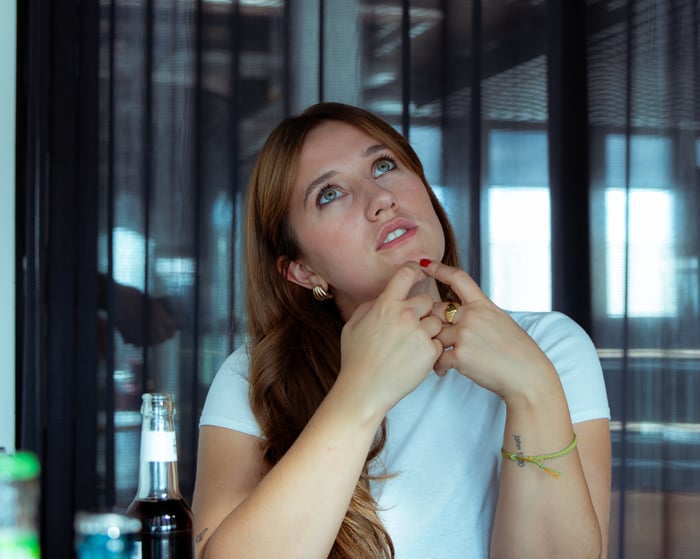
Frederike: How does your private persona differ from your artistic persona?
Muryel: My private persona is even more anxious. That's why my artistic persona puts all my fears and honesty into songs. It's also okay and healthy to keep a little distance from these things on the outside. My private persona reveals everything I think immediately, and I let everyone in right away, which makes me incredibly vulnerable.
Frederike: I found out something about you that I'd like to confirm first: Is it true that you performed in five musical productions at the Junge Akademie Stuttgart from 2011 to 2017?
Muryel: Yes, that's right. Musicals played a significant role in my life.
Frederike: What was your favorite part of musical theater? I guess there was a lot of singing, but maybe you also discovered an acting side to yourself?
Muryel: I haven't done it for a while, but I'd like to take it up again. I started writing my own stuff early on and I'm not limited by anyone else because it's my face and my name. But when I play a role, such as Grizabella in Cats, many people already know the character, so there are clear expectations. I found it very exciting to engage intensively with a role. Especially to remain authentic in situations where I would react very differently myself. Acting is a great challenge for me. Dancing wasn't exactly my strong suit, despite nine years of ballet lessons.
Frederike: Ballet? As in children's ballet?
Muryel: Yes, exactly. I started when I was three, and later also took up jazz and hip-hop. But it wasn't necessarily my strength.
Frederike: Did you perform your own pieces or existing ones?
Muryel: I once considered writing my own musical with friends from school. It was going to be called Change, and it would have depicted emotions as characters talking to each other, similar to the movie Inside Out. Fortunately, we didn't go through with it; there were only two songs. We performed well-known productions such as Flashdance, Grease, Hairspray, and Cats - amateur versions, of course, but it was a lot of fun.
Frederike: Did you learn anything from that time that you can apply today?
Muryel: A lot.
Frederike: For example, performing on stage?
Muryel: Exactly. Also, posture, presence, and understanding how to position yourself in relation to the audience. I learned about the effects certain movements have, when restraint is appropriate, and when presence is crucial. Those were important social skills, and, of course, jazz hands. I'm a theater kid through and through.
Frederike: And what do you do when you're not making music?
Muryel: I hang out with friends a lot; I don't really like being alone. Currently, I'm watching a lot of TV series. And I'm trying to get out into nature more, because sometimes the city isn't so good for me. I also love coffee and cake.
Frederike: Team cake or team pie?
Muryel: More like cake. Preferably a really good apple crumble, without cream. Lactose and I don't get along very well. I also really like plum crumble cake; my grandmother used to bake a great one. I also like watching documentaries about Scandinavia.
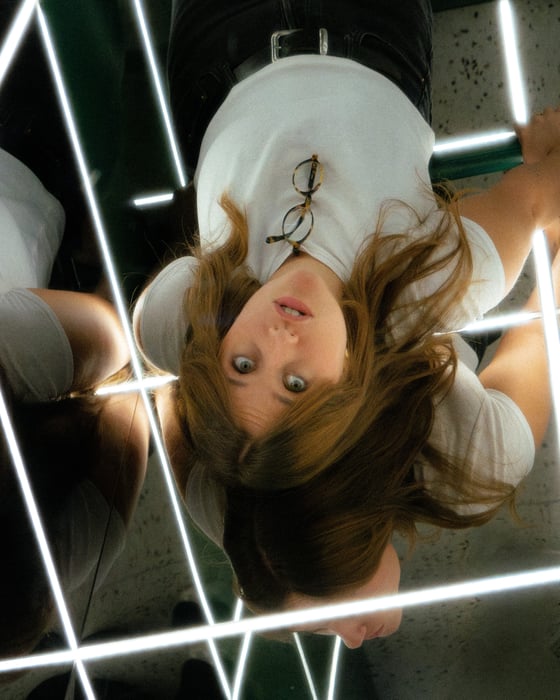
Frederike: Now imagine this scenario: You're at a party, you have the aux cable in your hand, and no one knows that you're about to start the song. Which song do you play? What is your guilty pleasure song?
Muryel: I love that question! I have a playlist called 'All Time Favorites' for that. Many people say I would definitely play Taylor Swift, and they're right. However, the song that always works is "I Wanna Dance with Somebody" by Whitney Houston. It instantly gets the party started.
Frederike: That's not a guilty pleasure, it's just good.
Muryel: True. My real guilty pleasure is "Absolutely Everybody" by Vanessa Amorosi; it’s terribly produced, but when it plays, everyone goes crazy. And honestly, "Baby" by Justin Bieber also works at every party. If you can dance to it, you're instantly the star of the evening.
Frederike: What else can we look forward to this year? Especially for fans or new readers who are just getting to know you.
Muryel: You should turn on the radio from time to time, because "Mad Men" is playing more often now. There will also be a few live dates, just come and see a show. If you come to a show, you should check out the songs beforehand, and then it will be really good.
Frederike: Is there anything else you'd like to say to our readers?
Muryel: Just say what you think and feel. And if I had to say what I dream of, it would be to play more internationally. One stage that particularly appeals to me is the Red Rocks Amphitheater in Colorado. I would love to perform there.
Frederike: Which artists would you like to meet or work with?
Muryel: I really appreciate Aaron Dessner (producer & songwriter). I would also be happy if some of my favorite artists knew I existed and liked my work.
Frederike: We have a Spotify playlist for each interview guest, featuring three to five songs, your own or others', that are important to you right now.
Muryel: My selection: "Walking in Memphis" by Marc Cohn, especially because my name is in it. "Bruises Off The Peach" by Ryan Beatty has great lyrics. "orange show speedway" by Lizzy McAlpine. I'd love to put one of mine because my friend Nina co-wrote the song, it's "The Only Good Thing In The City". "Unsicher" by Nina Chuba. And finally, my own song "House on Fire".
Frederike: Thank you, that's an excellent list.
Muryel: I could give you a whole playlist with two hours of music.
Frederike: Who are your top three favorite artists?
Muryel: Gracie Abrams, Lorde, and Maggie Rogers. I saw Maggie live in 2023 when The Weather Station opened for her; it was an outstanding concert.
Frederike: Thank you very much for your time, and hopefully we'll see each other again!
LISTEN TO HOUSE ON FIRE HERE:
LISTEN TO OUR ARTIST RECOMMENDATION PLAYLIST HERE:
SEE MORE PICTURES OF MURYEL HERE:
WRITTEN BY
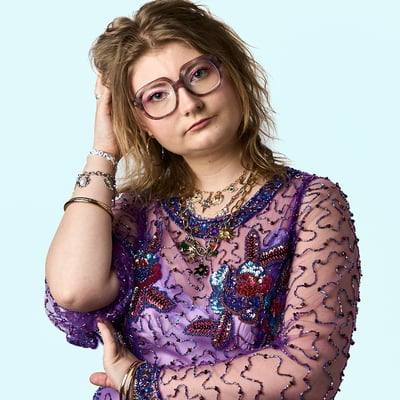
Frederike
Pop culture is my passion, and concerts are my second home. At Unseen Magazine, I dive deep into underground scenes, uncover unheard voices and bring new artists into the spotlight. I aim to showcase Berlin's vibrant music scene and what the mainstream bubble hasn’t discovered (yet).
PHOTOS BY
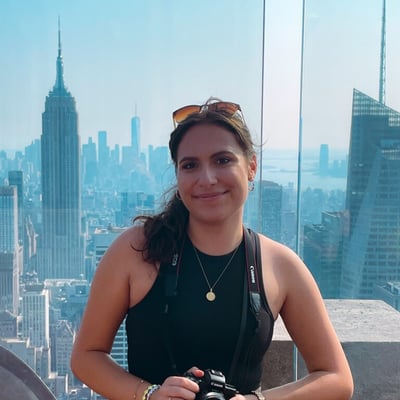
Pauline
I’ve loved photography since I was a kid and (live) music has always been such an important part of my life, getting to combine both of those things is a dream come true. I also love urban and street photography, especially while traveling. Any of my friends can tell tales about having to wait for me while i take pictures wherever we go haha. So: if you’re ever looking for me, chances are you’ll find me and my camera at a concert or out somewhere traveling (or at a concert while traveling).
